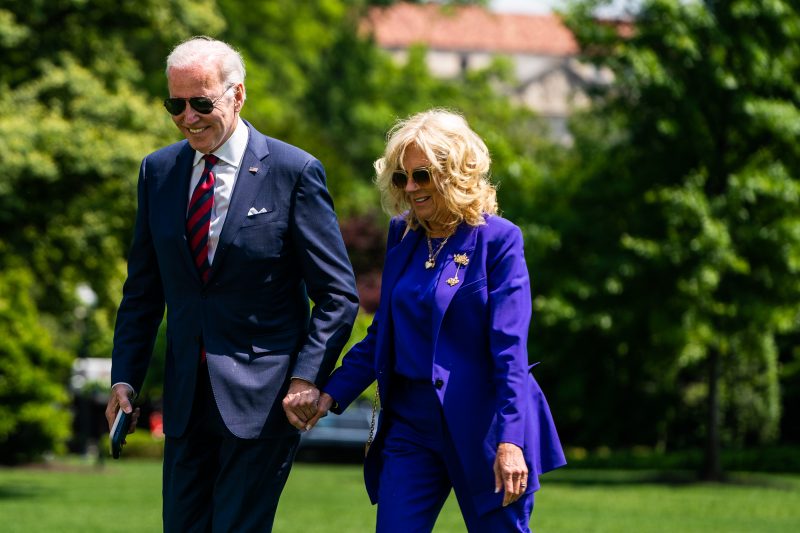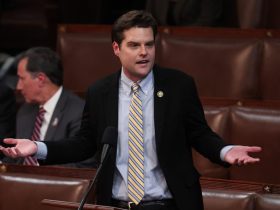TOKYO — President Biden heads to Japan on Wednesday for a wide-ranging trip that marks a renewed push on his part to confront China’s growing political, military and economic power, at a time when some experts warn that tensions between the two superpowers have grown dangerously high.
Biden is traveling to Australia and Papua New Guinea as well as Japan on the seven-day excursion, which is also aimed at bolstering support for Ukraine, combating climate change and tackling global inflation. But more than any other issue, the trip is meant to counter China, a global superpower that will not be at the meetings but will be very much top of mind.
The trip comes as U.S.-China relations show little sign of warming, to the concern of many foreign policy experts.
“No one is especially optimistic about the future of U.S.-China relations,” said John Delury, a professor of Chinese studies at Yonsei University in Seoul. “Blame will be apportioned differently, and opinions will diverge over whether U.S.-China tension is desirable, inevitable or avoidable. But most observers in the region will tend to share a pessimistic view of where things are headed.”
Administration officials say Biden has made clear he does not want a new Cold War with China, and that he has pushed to engage with the Chinese in areas where there is mutual interest or where it is crucial to avoid dangerous outcomes. But aides say the success of that effort depends in part on how firmly other countries ally with the United States in taking on Beijing’s aggressiveness.
“The best way to establish a constructive relationship with China, in which there is an understanding about the larger framing, is to do that diplomacy within the context of a strong allied and partner engagement,” said a senior administration official, speaking on the condition of anonymity to preview the president’s trip. “And that’s exactly what we’re trying to do.”
Biden’s trip will start Thursday with a summit of the Group of Seven leading economies in Hiroshima, Japan, where on Aug. 6, 1945, the Enola Gay, a U.S. bomber, dropped a uranium-235 bomb that killed an estimated 140,000 people. Biden and other leaders are expected to meet with survivors of that bombing.
Then, on Monday, Biden plans to be the first U.S. president to visit Papua New Guinea, an island nation in the Southwest Pacific, for a brief stop where he will address the 18-member Pacific Islands Forum. He is expected to sign a defense pact that will help Papua New Guinea develop security infrastructure and allow for more joint training exercises with the U.S. military.
Like the Japan visit, Biden’s stop in Papua New Guinea is aimed squarely at shoring up the global alliance against China, especially its expanding military operations in the South Pacific. China recently signed a pact with the Solomon Islands that allows the country to request security aid from Beijing, and in 2018, Papua New Guinea became the first South Pacific nation to sign up for China’s global infrastructure program known as the Belt and Road Initiative.
John Kirby, a spokesman for the National Security Council, confirmed that Biden would discuss China policy with other world leaders, but he said the president’s trip is not about making countries choose between Washington and Beijing. Rather, he said, “countries are coming to their own conclusions about some of the pitfalls” of siding with China.
“We are not going to the Indo-Pacific this week to arm-twist,” Kirby said. “We’re going to talk to allies, partners, friends and neighbors about mutual challenges and opportunities in the region, and how we can capitalize on each other’s capabilities and the strong geographic presence so many of these nations have.”
When Biden took office, he sought to take a more assertive posture in the region, including an effort to wrap in smaller countries that had long felt neglected. The administration last year hosted a U.S.-Pacific Island summit in Washington, bringing leaders together to negotiate new security arrangements.
The president will continue his push in Australia, which recently signed a deal to receive submarine technology from the United States and Britain in a counter to China’s military expansion in the Indo-Pacific region. In Sydney, Biden will join meetings of the so-called Quad, a group that includes Australia, India, Japan and the United States.
But as each side pushes to shore up its alliances and expand its influence, some foreign policy experts warn that Washington and Beijing are on a dangerous path.
“The two cannot continue aggravating and goading each other,” said Kerry Brown, professor at King’s College London and author of “The World according to Xi.” “The rest of the world lives like dependents of two warring parents who are determined to rip the house up if they cannot get their own way. This is a very scary situation, and one that needs to be constantly managed and worked against.”
Michael O’Hanlon, a foreign affairs specialist at the Brookings Institution, added, “We’ve got to find a way to tone down the overall rhetoric.”
In November, Biden met with Chinese leader Xi Jinping during a Group of 20 summit in Bali, Indonesia, using the decades-long relationship between the two men to try to smooth relations between the two countries. They emerged pledging to work together and deputized their advisers to conduct high-level meetings on a range of topics.
But tensions flared anew when a Chinese spy balloon floated across the United States before being shot down off the Atlantic coast. Secretary of State Antony Blinken responded by canceling a trip to Beijing, and despite talk of a phone call between Biden and Xi, none has been scheduled so far.
U.S. and Chinese officials have spoken in recent weeks, including a meeting between Jake Sullivan, Biden’s national security adviser, and China’s top diplomat Wang Yi. The senior administration official said there is an expectation that Biden and Xi will engage again in coming months.
But the relationship remains tense, and Delury said the possibility for progress that came out of the Biden-Xi meeting six months ago has largely evaporated. “We seem to be out of free-fall and settling into a period of slower yet steady deterioration,” he said.
The trip also comes at a dicey moment in domestic politics. Biden’s trip could be overshadowed by concerns over whether Congress will allow a potentially catastrophic U.S. government default. Asked last week whether he might cancel the trip amid his debt limit talks with lawmakers, Biden said it was “possible but not likely.”
Biden’s trip also comes ahead of the 2024 campaign, at a time when many Republicans are challenging longtime pillars of U.S. foreign policy, arguing for less American engagement in the world — and in some cases, less confrontation with authoritarians.
“I’ve rarely seen a foreign policy right now more tethered to domestic political constraints than we have now — on Iran and on China, and even to Ukraine to an extent,” said Aaron David Miller, a veteran diplomat and senior fellow at the Carnegie Endowment for International Peace. “Biden would say the greatest threat the public faces is not Xi or Putin, it’s from us. We’ve seen the enemy and it’s us. We have to repair ourselves.”
Even as officials look for ways to lower the heat between the two superpowers, conflicts over issues like Taiwan appear likely to keep flaring up, as China bristles at any U.S. suggestion that the self-governing island is not Chinese territory. In recent months, Russia’s invasion of Ukraine has fed concerns that China could similarly move into Taiwan.
“Ukraine today may be East Asia tomorrow,” Japanese Prime Minister Fumio Kishida has said.
In addition to the G-7 countries, Japan has invited several developing nations to the Hiroshima summit, including Brazil, Vietnam, Indonesia, India, Comoros (which currently holds the African Union presidency) and the Cook Islands (current chair of the Pacific Islands Forum). South Korea and Australia, which are not part of the G-7, were also invited.
At the summit, leaders are expected to focus on concerns about economic coercion on the part of Beijing, but it is not clear whether China will be criticized in a public statement.
“It’s up to the leaders,” said a senior Japanese government official, speaking on the condition of anonymity to talk candidly.
“Our target is not to get them to explicitly reject a deepening dependence on China,” the official said, adding that the leaders would not make such a declaration in any case. “But raising their awareness that overreliance on one country, and using the economy as a diplomatic tool to gain an advantage, these are not a good thing. If these are the messages we can share with Asian countries, it would be a good thing.”
Biden has significantly increased his international travel this year, already visiting six countries and with more trips planned. With a deeply divided Congress, it is a moment in his presidency where he can arguably effect more change abroad than he can at home.
Hanging over the trip is the possibility that a different president could be in office after the 2024 election, possibly even Donald Trump, who during his time in the White House was eager to disrupt U.S. alliances and reach out to its rivals.
“The U.S. does have a proactive role in the region, but with an election coming up at the end of next year, all that could change,” Brown said. “Ironically, these days the U.S. is the more unpredictable partner. Under Xi Jinping, China has become way more predictable — though often not in an entirely positive or reassuring way.”
Pager reported from Washington. Ellen Nakashima contributed to this report.








